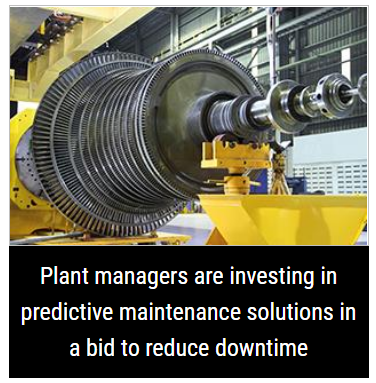Assessing asset health

Dr Tom Knott explains how on-site oil analysis could give control back to industry decision-makers.
When it comes to minimising disruptive maintenance work and lowering costs, prevention is better than cure. Using oil condition monitoring as a predictive maintenance solutions can provide a deep insight into ongoing system health, reducing the risk of equipment damage caused by unknown contaminants in the system.
Keeping an eye on the quality and integrity of your oil is nothing new to most industries that rely on lubrication, hydraulic or coolant fluids. Almost 70% of industry respondents to a Spectro Scientific survey had some form of reliability monitoring programme in place. It’s safe to say that most decision-makers are aware that tracking the status of machine lubricant to enable predictive maintenance action is an essential practice.
Predictive maintenance is the sweet spot where facility managers can make decisions based on timely data about the health of their critical machinery assets. This is more cost-effective than preventative maintenance, where oil replacements are carried out based on a routine schedule, and far more economical than reactive maintenance, when components break and shut down production until the problem is fixed.
This predictive strategy is especially important in those industries where replacing worn bearings or overheated components is particularly difficult, such as offshore power generation and remote materials processing sites.
In 2023, most OCM programmes involve sending samples to professional laboratories. Although providing the peace of mind that analysis is executed by experts, this outsourcing practice can limit businesses in a number of ways.
For one, the timeframe of sending a sample to the lab and waiting for the report is usually multiple weeks. With each passing day, maintenance managers could be running out of time to intervene in the mechanical decline of a vital asset.
Another issue with outsourcing the OCM process is the rising cost. The UK’s industrial services have been universally inflated by the Covid-19 pandemic and supply chain issues from China. The necessary increase in cost constrains testing volume: if you can only test six samples per month instead of 10, the likelihood that you miss a burgeoning problem increases.
These same geopolitical factors that are prompting quality managers to seek more cost-effective alternatives to outsourcing their oil condition monitoring needs also compound the potentially ruinous costs of a reactive maintenance policy. If your machine breaks and halts business, you might be waiting weeks, not days, for a replacement part.
Solving the fluid analysis conundrum
On-site fluid analysis instruments can significantly boost testing volume, improve sustainability and provide immediate results to give maintenance managers the best platform from which to make decisions and keep business running smoothly.
In the first implementation year of an on-site OCM programme that only tracked one parameter of oil quality, a US-headquartered industrial manufacturer of animal feed cut its unplanned maintenance downtime by 50%. Furthermore, the company saved almost US$1 million (~£810,000) in lost production time and gear failures.
It’s true that the short-term investment costs of in-house OCM can deter facility managers from pursuing this as a cost-saving avenue. Additionally, it’s natural for engineers and machine operators without a chemical background to feel unprepared to take on the role of oil analyser. Although understandable, these concerns can easily be assuaged.
OCM instruments are often sold as modules, each responsible for analysing different properties of the classic oil condition tri-vector; wear, contamination, and chemistry & viscosity. This is true of the Minilab series from Spectro Scientific, a central docking station with multiple portable analysers. Maintenance managers can select the instrument most relevant to their business without investing in the whole selection.
One helpful device in this endeavour is a common software feature that allows the operator to schedule tests, collate and trend results, set alarm/action limits and track how much money has been saved on lubricant purchases, unplanned downtime and labour costs.
Indeed, the benefit to maintenance budgets is something worth highlighting. Although the initial cost of investment might appear significant, the savings produced from predictive oil condition monitoring can be lucrative. An American city saved US$2 million (~£1.62 million) in one year by extending the interval periods between oil changes in a large municipal fleet of city vehicles. Uncertainty about the rapidity of oil degradation had pressured the city into spending millions on a preventative maintenance strategy and servicing their vehicles before it was necessary.
The popularity of on-site oil condition monitoring is set to sky-rocket in the coming years, as maintenance managers across the globe seek to optimise processes to protect their businesses against rising costs and increasingly drastic consequences for inadequate instrumentation management.
1.The news above mentioned with detailed source are from internet.We are trying our best to assure they are accurate ,timely and safe so as to let bearing users and sellers read more related info.However, it doesn't mean we agree with any point of view referred in above contents and we are not responsible for the authenticity. If you want to publish the news,please note the source and you will be legally responsible for the news published.
2.All news edited and translated by us are specially noted the source"CBCC".
3.For investors,please be cautious for all news.We don't bear any damage brought by late and inaccurate news.
4.If the news we published involves copyright of yours,just let us know.
BRIEF INTRODUCTION
Cnbearing is the No.1 bearing inquiry system and information service in China, dedicated to helping all bearing users and sellers throughout the world.
Cnbearing is supported by China National Bearing Industry Association, whose operation online is charged by China Bearing Unisun Tech. Co., Ltd.
China Bearing Unisun Tech. Co., Ltd owns all the rights. Since 2000, over 3,000 companies have been registered and enjoyed the company' s complete skillful service, which ranking many aspects in bearing industry at home and abroad with the most authority practical devices in China.



